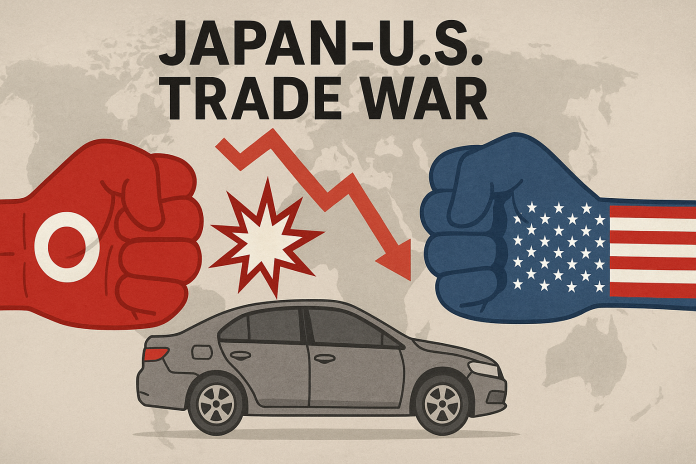Japan’s largest car companies are now facing a tough time amidst the trade war with USA.
Car Makers Face Sudden Setback
New tariffs from the United States and a stronger Japanese yen have created big challenges for firms like Toyota and Honda. These companies make and sell millions of cars worldwide. But recently, their profits have taken a big hit.
The U.S. has increased tariffs on imported Japanese cars and auto parts. These are taxes that make Japanese cars more expensive in America. To stay competitive, Japanese companies were forced to lower their export prices. In June, Japanese automakers dropped U.S. export prices by 19%. That’s the largest cut since 2016. But by doing this, they lost profit margins even though their sales numbers were still strong.
Toyota, which usually performs well in most quarters, likely saw a dip in its operating profit. Even though the company recorded record global sales in the first half of the year—thanks to buyers rushing in before the tariffs started—the cost of materials and the supply chain weighed heavily on earnings.
📉 Trade crackdown gone wrong — Vietnam defies U.S. pressure, deepens ties with China
Honda also faced similar trouble. The stronger yen made Japanese exports more expensive overseas. At the same time, the company had to deal with higher operating expenses and weaker sales in Japan and China.
All these factors added up to reduced profits. Analysts believe both car makers are struggling to balance higher costs and lower prices.
These changes didn’t happen slowly. The shift came quickly and impacted how these big automakers operate in a major market like the U.S. Lowered tariffs may offer relief later, but for now, the industry is clearly feeling the pressure.
Defense Firms Rise Despite Tariff Trouble
While Japan’s car makers are struggling, defense companies in the country are seeing better results. Government spending on defense has been going up. This extra money is helping major firms that work in defense, aircraft, and space.
Companies that manufacture planes, missiles, and defense equipment are seeing growth in both sales and profit margins. For instance, one major Japanese defense firm likely saw its business profit rise by over 3%. The reason? A gradual recovery in airplane production and strong demand for defense systems.
Labor Law Compliance as a Service (LCaaS): A Bold New Frontier for RegTech Startups
Another key player in Japan’s industrial sector—known for both motorcycles and military gear—likely experienced a sharp rise in quarterly profits, by as much as 65%. This was mostly due to stable sales, better margins from air travel recovery, and more defense orders from the government.
Although parts of these companies—like their power-sports divisions—are still feeling pressure from tariffs, their defense business is helping offset the losses. This shows a clear divide in Japan’s industry: while automakers suffer from U.S. trade changes and currency issues, defense companies are growing due to higher local demand and public funding.
The defense industry in Japan has always been steady. But now, with increased investment from the government, these companies are expanding faster than before. Their role in aircraft manufacturing, space technology, and military supplies has become even more important, especially as global trade patterns shift.
Broader Impact of Trade War Across Japan’s Economy
The effect of U.S. tariffs and the stronger yen is being felt across multiple sectors in Japan. Financial institutions, airlines, shipping companies, and tech firms are all seeing mixed results.
Japan’s biggest bank likely reported strong profits, with earnings crossing 25% of its full-year target. Analysts say that good returns on equity and steady performance helped this result.
💸 Mega deal or misfire? Japan’s $550B pledge unlocks tariff relief but angers American industry
However, shipping companies had a different experience. One major firm probably saw a 21% drop in quarterly operating profit. The trade war and global economic changes have made container shipping more expensive and uncertain.
Japan’s largest airline also faced challenges during the ongoing trade war with US. Its net income dropped by nearly 9% in the first half of the year. Still, lower fuel prices helped balance out some of the losses caused by rising non-fuel expenses.
On the technology side, a major game and network company in Japan is expected to show a sharp increase in operating income—up by 41%. This rise is thanks to popular gaming titles and a strong base of online subscribers.
Meanwhile, a major investment firm in Japan is working to recover after earlier losses. Reports suggest it might return to profit in the current quarter. But to meet its investment plans and pay off upcoming debt, it may need to raise between $10 billion to $30 billion soon.
Lastly, Japan’s biggest public bank raised close to $3 billion through a large share sale. This move is meant to support its loan business and strengthen its financial position amid growing pressure from interest rate changes.
In summary, Japan’s economy is being pulled in two directions. On one hand, the car industry—long considered the heart of the country’s exports—is being squeezed by foreign tariffs and currency issues. On the other hand, sectors like defense, tech, and banking are showing growth in this trade war. The sudden shift in global trade policies and currency movements is changing how these companies perform and forcing many to adapt quickly.


